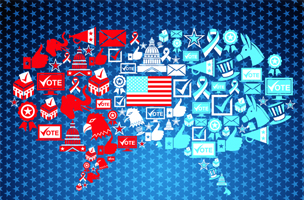In the nature of politics today, bipartisanship seems to be
rare, and far and few between nowadays. More and more people are starting to
lean purely towards actions and ideology that match their parties’ beliefs and are
reluctant to occasionally side with the “enemy” party. This is essentially the
idea of people living inside their own cozy echo chambers, which ultimately
results in more heated disagreement and hatred of opposing viewpoints amongst politicians
and party supporters alike.
An echo chamber is one’s reinforcement of their previously held
beliefs and agreed upon ideas and the restriction of any information or ideas
that conflict with their ideology through selectively filtering their
consumption of media. To put it simply, an echo chamber is how to describe
blocking out specific information and news to continue to go out of their way
to hear the same voices, opinions, and ideas that match your own. A person with
an echo chamber adamantly disagrees with information or another side’s point of
view to the point where they don’t take them in at all. It’s similar to a “filter
bubble”, where people are cut off from varying outside information (like living
in a bubble), but it differs in the sense that echo chambers refuse to trust
any information outside of the content within their bubble. This is especially
apparent and applicable at the political news level, where a democratic supporter
will only listen, read, and watch news that corresponds and agrees with a
democratic ideology. The same goes for Republicans or any other ideology.

As a result of these echo chambers and bubbles, there are a
lot of negative implications that are seen in the spread of public information
and discourse. For one, misinformation is easier to plant inside the minds of those
locked in echo chambers. By being stuck in an echo chamber, people don’t stumble
across information that differs from their previously held beliefs, and if they
do, they often discredit them right away for being so different. Lack of
information can obviously lead to misinformed decisions on who they should vote
for, what policies they agree with, and it limits their perspective overall. Furthermore,
polarization and animosity towards those we disagree with enhances throughout
society in these echo chambers and filter bubbles. The idea is that the
information we engage in grows to despising those who would even think to
disagree with our perspective. The information constantly paints the other side
as purely negative and suggests that there is no room for common ground. So,
when they do encounter someone with a differing opinion (whether in-person or on
social media), it turns hateful and personal rather than becoming peaceful
dialogue about the current state of affairs. One study posted in PsychologyToday
even found a pattern that polarization tends to be a consistent way that information
is spread amongst Twitter users. As a longtime twitter user, I know I’ve
seen my fair share of twitter arguments about a wide variety of topics turn
nasty and personal. I’m sure a lot of these arguments and online polarization
have grown because people have developed a less open mind and distrust of differing
ideologies due to echo chambers that rotate the same beliefs over and over
again.
I also personally believe echo chambers tend to group people
together based on their social status and identities. I believe people are much
less open to reading and willingly be subjected to opinions that differ from
their social status. So, the rich will only partake in media and news outlets
that discuss and monitor topics of the rich, thereby spreading information and opinions
that fit the riches’ motivations. The same goes for the poor because they subsequently
indulge in differing media news that pertains to their state of affairs. Therefore,
the rich and the poor are pitted against each other because society sort of
forms these echo chambers based on class, which means they can’t read about perspectives
that pertain to the other side. This same goes for old and young generations,
and debates about race and so on.
All in all, it’s important to be wary of locking oneself
into an echo chamber. The perspectives we hold can make us fiery and
passionate, which makes it important for us to make sure our stances don’t
polarize or divide us. Although it is an often-overused phrase, it is important
to put yourself in others’ shoes to create a dialogue and keep out of the dangerous
depths of echo chambers.
To learn more about echo chambers, watch this TedTalk by
Adam Greenwood, who discusses the present dangers of echo chambers if they were
applied in the real world, how we often perpetuate the implications of online echo
chambers ourselves, and how to prevent ourselves from building our own echo
chambers.


No comments:
Post a Comment